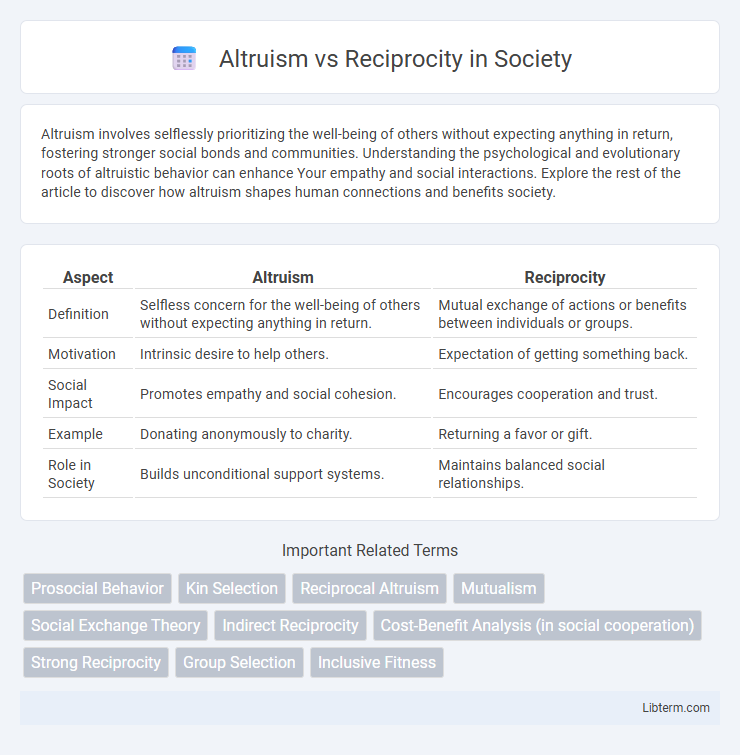Altruism involves selflessly prioritizing the well-being of others without expecting anything in return, fostering stronger social bonds and communities. Understanding the psychological and evolutionary roots of altruistic behavior can enhance Your empathy and social interactions. Explore the rest of the article to discover how altruism shapes human connections and benefits society.
Table of Comparison
| Aspect | Altruism | Reciprocity |
|---|---|---|
| Definition | Selfless concern for the well-being of others without expecting anything in return. | Mutual exchange of actions or benefits between individuals or groups. |
| Motivation | Intrinsic desire to help others. | Expectation of getting something back. |
| Social Impact | Promotes empathy and social cohesion. | Encourages cooperation and trust. |
| Example | Donating anonymously to charity. | Returning a favor or gift. |
| Role in Society | Builds unconditional support systems. | Maintains balanced social relationships. |
Understanding Altruism: Definition and Origins
Altruism refers to selfless behavior aimed at benefiting others without expecting any reward, rooted in biological and psychological theories such as kin selection and empathy-driven motivation. Origins of altruism trace back to evolutionary biology, explaining how acts of kindness increase the survival of related individuals or social groups. Understanding altruism involves exploring its role in human social dynamics and its distinction from reciprocity, which involves mutual exchange and anticipated returns.
Decoding Reciprocity: Meaning and Mechanisms
Reciprocity involves mutual exchange where actions are motivated by the expectation of return, distinguishing it from altruism, which operates without anticipation of reward. Mechanisms underpinning reciprocity include direct reciprocity, where individuals help those who have helped them, and indirect reciprocity, relying on reputation and social norms to encourage cooperative behavior. Understanding these mechanisms reveals how reciprocity fosters cooperation and social cohesion in various biological and social systems.
Key Differences Between Altruism and Reciprocity
Altruism involves selfless actions performed to benefit others without expecting anything in return, emphasizing genuine concern for others' well-being. Reciprocity, on the other hand, is based on mutual exchange where actions are driven by the expectation of a return favor or benefit. The key difference lies in motivation: altruism is unconditional and other-centered, while reciprocity operates on a conditional, reciprocal relationship principle.
Psychological Motivations Behind Altruistic Acts
Altruism involves selfless concern for the well-being of others, driven by intrinsic psychological motivations such as empathy, compassion, and moral values. Reciprocity, by contrast, is motivated by the expectation of mutual benefit, where individuals engage in helpful behaviors anticipating future returns or social approval. Neuroscientific studies identify activation in brain regions like the anterior insula and the ventromedial prefrontal cortex during altruistic acts, highlighting the emotional and reward-based underpinnings distinct from purely reciprocal exchanges.
The Role of Reciprocity in Human Relationships
Reciprocity plays a crucial role in human relationships by fostering trust and cooperation through mutual exchange of benefits, which strengthens social bonds and group cohesion. Unlike pure altruism, where actions are selfless without expectation of return, reciprocal behavior is motivated by the anticipation of future returns, making it a key mechanism in social and evolutionary psychology. Studies in behavioral economics and anthropology highlight reciprocity as essential for maintaining fairness and long-term cooperation in communities.
Evolutionary Perspectives: Altruism vs Reciprocity
Altruism in evolutionary biology refers to behaviors that benefit others at a cost to the individual, often explained by inclusive fitness and kin selection theories that promote gene propagation through relatives. Reciprocity involves mutual exchanges where individuals provide benefits with the expectation of future returns, supporting cooperation among non-kin through direct or indirect reciprocal interactions. Evolutionary perspectives highlight that both altruism and reciprocity contribute to social cohesion and survival by enhancing cooperative behaviors that increase overall fitness in complex social species.
Real-Life Examples of Altruism and Reciprocal Behavior
Altruism manifests in real life through acts like donating blood, volunteering at shelters, or helping strangers without expecting anything in return, highlighting genuine selflessness. Reciprocal behavior is evident in everyday exchanges such as coworkers assisting each other with tasks anticipating future help, or neighbors lending tools with the expectation of mutual support. These examples demonstrate the key difference where altruism is driven by innate kindness, while reciprocity operates on a mutual benefit basis.
Altruism and Reciprocity in Social and Cultural Contexts
Altruism in social and cultural contexts reflects selfless concern for the well-being of others, often motivated by empathy, moral values, or social norms that encourage cooperative behavior within communities. Reciprocity operates as a foundational social mechanism where individuals exchange benefits, fostering trust and mutual support that sustain cultural cohesion and group survival. Both altruism and reciprocity shape social bonds, with altruism promoting unconditional generosity and reciprocity ensuring balanced interactions and cultural continuity.
Benefits and Drawbacks of Altruism and Reciprocity
Altruism promotes selfless actions benefiting others without expecting returns, fostering trust and social cohesion but can lead to exploitation and resource depletion. Reciprocity drives mutual exchanges, encouraging cooperation and balanced relationships, yet may result in transactional interactions and conditional support. Both altruism and reciprocity influence social dynamics by balancing self-interest with collective well-being, shaping human behavior in communities and organizations.
The Future of Altruism and Reciprocity in Modern Society
The future of altruism and reciprocity in modern society hinges on the integration of digital technologies and social networks that amplify cooperative behavior and trust-building mechanisms. Empirical studies highlight how blockchain and AI-driven platforms incentivize transparent, scalable reciprocal exchanges, fostering global communities centered on mutual aid and ethical collaboration. As social dynamics evolve, understanding the psychological and economic impacts of altruism and reciprocity becomes crucial for developing sustainable policies and social innovations that enhance collective well-being.
Altruism Infographic

 libterm.com
libterm.com